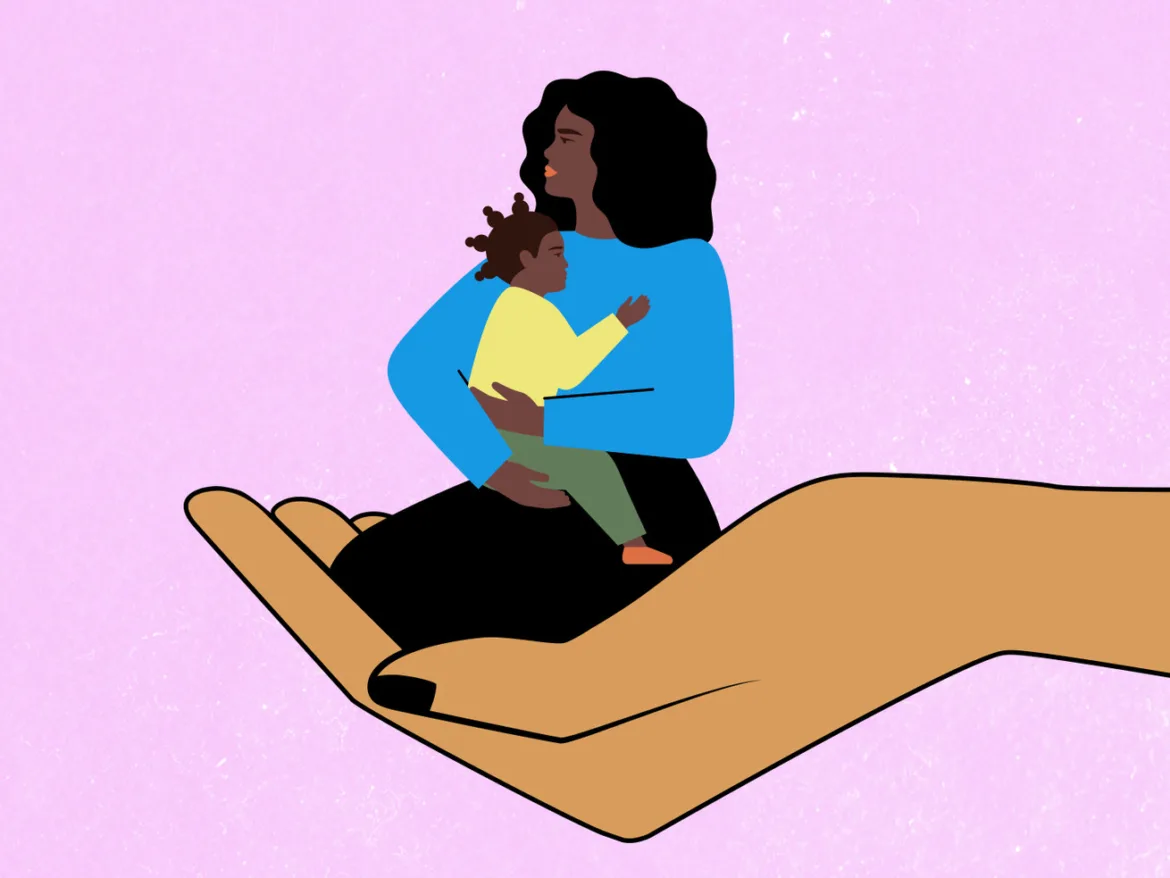What doulas, midwives, and policymakers are doing to end the maternal mortality crisis.
Over the last 30 years, nearly every wealthy country in the world has made it much safer for people to have babies. Only one outlier has moved in the opposite direction: the United States, where the rate of people dying in childbirth continues, stubbornly and tragically, to rise. In 2021, 1,205 US women died from birth-related causes, up from 754 in 2019. Many of those deaths — a full 89 percent in one Georgia study — are potentially preventable with the proper care.
Black people who give birth are at especially high risk. Nationwide, the maternal mortality rate for Black women is 2.6 times the rate for white women. Some regions have even bigger disparities: In Chicago, the rate for Black women is almost 6 times the rate for white women; in New York City, it’s 9 times.
The causes are big societal problems: failing hospitals (or no hospitals at all), lack of access to affordable health care, and doctors and nurses who dismiss Black women’s pain. These issues may seem intractable, but activists, clinicians, and scholars around the country are already working on solutions: ensuring access to Black doctors and nurses, creating new models of prenatal care that give Black patients a bigger support system, and expanding Medicaid to make sure patients can get care from preconception to postpartum.
Karie Stewart, for example, started Melanated Group Midwifery Care three years ago to provide prenatal and postpartum care “for Black people, by Black people.” As a labor and delivery nurse in Chicago, Stewart said that she always noticed that Black patients were treated differently. “Their care was not even close to what their counterparts were getting,” she said.
To help combat those inequalities — and the dangers birthing people and babies can face when they get substandard care — Melanated Group connects each patient with a Black midwife, doula, nurse, and social worker. Together, they make sure that no matter what issues come up during or after pregnancy, patients always have someone to reach out to — someone who will actually listen to their concerns.
Black families and reproductive justice advocates have been sounding the alarm on maternal deaths for years, and lawmakers are beginning to listen. Almost all states have extended Medicaid coverage for 12 months postpartum, the period when most maternal deaths occur, and a dozen states have expanded Medicaid to cover doula services. New York Gov. Kathy Hochul recently proposed a six-point plan to address maternal mortality, including provisions to improve mental health care and make prenatal care more affordable and accessible.
Much more is necessary, and with every birth, researchers like Stewart are hoping to provide a roadmap for policymakers and hospitals looking to combat centuries of racism and save Black birthing people’s lives.
“[We can’t] let the 400 years of colonialization, enslavement, Jim Crow, and discrimination be so paralyzing that one is disinclined to act,” said Amanda P. Williams, an OB-GYN and clinical innovation adviser at the California Maternal Quality Care Collaborative. “It really is possible to be better.”
These four solutions can make birth safer
Behind the statistics are countless devastating stories: In 2023, Christine Fields, 30, bled to death after giving birth to her son at Woodhull Medical Center in Brooklyn, the New York Times reported.
A pregnant Illinois teenager experiencing chest pain visited the ER, but doctors tested her urine for drugs and sent her home, according to a state study of maternal deaths between 2018 and 2020 reported in the Chicago Sun-Times. After another hospital visit, she was diagnosed with a heart condition, but doctors didn’t schedule a follow-up cardiology appointment with her until weeks later. She died of cardiomyopathy when her baby was a month old.
Serena Williams, the groundbreaking tennis champion, said in 2018 that she wasn’t taken seriously by medical staff when she experienced a pulmonary embolism after giving birth to her daughter, Olympia; it was a reminder that wealth, education, and socioeconomic status do not protect Black birthing people from racism in the delivery room.
Across the country, however, researchers, midwives, doulas, and doctors are studying interventions that can protect Black families through pregnancy, birth, and beyond. Below are four of the most promising approaches:
- Having Black doctors and nurses on the medical team. Some research has found better outcomes for Black patients who are treated by doctors of the same race — for example, one 2020 study found that Black newborns had lower mortality when they were cared for by Black doctors. The reason may have to do with the “shared experience of having had to deal with racism and discrimination,” said Doee Kitessa, an OB-GYN and professor at the University of Maryland School of Medicine. Many Black patients “have not had a doctor that looks like them,” and when they do get the opportunity to see a Black physician, “it’s like a relief that they feel, like, I’ll be heard and listened to,” Kitessa said.
“It is not going to be necessary that every Black patient is going to find a Black doctor, and they may not want that,” Kitessa said. But “having that greater diversity among the pool of physicians brings greater diversity of perspectives.”
Diversifying the medical workforce is also Williams’s top recommendation for making birth safer for Black people. Today, only about 5.7 percent of doctors in the US are Black, even though Black Americans make up about 13 percent of the population. Melanated Group and other programs around the country are working to match Black patients with Black midwives and OB-GYNs, but there’s an urgent need for more practitioners of color. “We have to have scholarships for first-generation families and historically marginalized communities to start developing that pipeline,” Williams said. Anti-affirmative action rulings and conservative anti-DEI initiatives threaten to make the problem worse by making it harder for colleges and medical schools to recruit students from historically marginalized groups, she added.
- Improving access to doulas. Doctors and nurses aren’t the only ones who can help Black patients have safer births. Research has shown that having a doula can lower the likelihood of birth complications and reduce postpartum depression and anxiety. The latter is especially important since mental illness is the top cause of maternal death in the US, driving suicides and opioid overdoses, according to an evidence review published earlier this year in the journal JAMA Psychiatry.
A doula’s job is to support and advocate for the birthing person during labor and delivery, which can be crucial for Black patients, who often face discrimination or disregard in medical settings. Black and other marginalized birthing people sometimes “need that extra person there to really stand up for them,” said Thomecia Busby, a doula and leader of the Georgia Doula Access Working Group. “I’m just really being that third eye in the room and really sitting in as that liaison between you and the hospital staff, and making sure that even if things change from the plan, you are always feeling comfortable in your decisions.”
Doulas can also offer prenatal support, answering questions and even attending appointments with clients. After birth, they can help with breastfeeding, household tasks, postnatal massage, and connecting patients to outside services such as support groups.
Doula services can be expensive, ranging from $500 to more than $2,000, putting them out of reach for many low-income families. A growing number of states, including Florida and Virginia, now cover doula care under Medicaid, but access hurdles remain. Other states, such as Georgia, have launched pilot programs to cover doula care on a smaller scale.
- Group prenatal care. In addition to who provides care for Black birthing people, some researchers are looking at how that care gets delivered. Melanated Group Midwifery Care and other practices around the country are experimenting with group prenatal care, in which patients join cohorts of eight to 10 people who meet with a doctor for regular two-hour discussion sessions (physical exams and other tests can still be done privately). The groups help break down the hierarchical nature of doctor’s appointments and can make patients feel more comfortable asking questions, said Stewart, the Melanated Group founder. “We all sit in a circle,” Stewart said. “It’s really like a gathering, a little prenatal party.”
Past research has found that group prenatal care can reduce the risk of preterm birth, especially for Black birthing people, possibly by reducing stress. The approach also helps patients feel more ready for labor and more satisfied with their care overall. In addition to Melanated Group, researchers in Missouri, California, and elsewhere are studying the model to learn more about the benefits.
“I felt really embraced with every appointment,” said Richelle Smith, who got group prenatal care as part of the EleVATE initiative in St. Louis and now conducts trainings for the program. Smith says her prenatal care experience helped her have a smooth birth. “I was empowered and my husband was empowered to advocate for me.”
- Medicaid expansion. While interventions like group prenatal care can be implemented on a small scale, there’s one big policy change that’s been shown to have a major impact on maternal health: States that took the Medicaid expansion under the Affordable Care Act, allowing more people to qualify for affordable health insurance, have fewer maternal deaths than states that did not expand their programs, according to a 2020 study. The expansion had an especially big effect on Black birthing people. “There are such stark disparities in maternal health,” said Erica Eliason, a postdoctoral researcher at the Brown University School of Public Health and the author of the study. “The group that we’re going to see benefit the most is the group whose outcomes are the worst.”
Despite such benefits, 10 states — including some with the highest maternal mortality rates, such as Texas and Florida — still have not taken the Medicaid expansion. Most states have extended Medicaid eligibility to cover birthing people for 12 months postpartum, an important move because most maternal deaths happen in the year after birth. But just covering people after birth misses out on a crucial benefit of the Medicaid expansion: better health care for people before they even get pregnant. More people in expansion states can get timely care for chronic conditions like diabetes and hypertension, Eliason said, making for a safer pregnancy and birth down the road.
Helping Black birthing people means getting hospitals — and Congress — on board
Policymakers and clinicians are experimenting with other interventions too, from hospital equity trainings to prenatal leave. The California Maternal Quality Care Collaborative, for example, has created a hospital action guide for equitable obstetric care, covering issues from visiting hours to drug testing, and is studying whether training based on this guide can reduce C-section rates. In New York, Gov. Hochul’s plan would provide 40 hours of paid leave for prenatal care appointments, addressing what experts say is a significant barrier: time off from work to go to the doctor.
Meanwhile, researchers like Stewart are working to find the best ways to combine different programs and scale up their work — Melanated Group is in the third year of a five-year study, having enrolled about 150 of a prospective 400 people. It hasn’t published its results yet, but it has hosted reunions where new parents bring their babies and talk about their experiences. “They’re very excited and grateful,” Stewart said.
Even though the work is ongoing, federal and state lawmakers, as well as hospitals and health systems, can use as soon as possible what Melanated Group and others have learned to help Black patients have safer pregnancies and births. But it will require surmounting major barriers.
One is opposition in Congress. The Black Maternal Health Momnibus Act, a 13-part piece of legislation that includes funding for diversifying the birth workforce and improving maternal mental health, has been at the top of many maternal health advocates’ wish lists since it was first introduced in 2020, but only one part, a provision to help pregnant and postpartum veterans, has made it into law. At the state level, Republican legislators and governors have blocked Medicaid expansion because they oppose government spending, though pro-Medicaid momentum has been building in recent months.
In other cases, policy changes haven’t always led to improvements in access. In California, for example, only about 70 claims for doula services were filed last year out of about 200,000 Medicaid births, Williams said. “Just because you have a benefit doesn’t mean that you know where to go, how to sign up, how does this work. So it’s the connecting of the patients to the doulas.”
Low reimbursement rates can also be an issue for doulas — Busby works on a new Georgia program that reimburses doulas $1,000 per patient, which she described as “a minimum of what doulas should be getting paid.” Hospitals also need to work to integrate doulas into their care. “There’s certain hospitals that allow the doulas to come in, but then there’s certain people that are on staff who may not like doulas being in the space,” Busby said.
No program to help Black birthing people can have its full effect if hospitals aren’t on board, experts say. Some Melanated Group patients have reported that the support they felt in their group prenatal care appointments went out the window when they showed up to deliver the baby. When they get into labor, sometimes “it’s a battle,” Stewart said.
Collaboration — between hospitals and midwives, and between doctors and the pregnant patients who come in for care — is crucial to helping people give birth safely, experts said.
“This is just the wave of the future, and how we should be providing prenatal and postpartum care for the Black community,” Stewart said.



